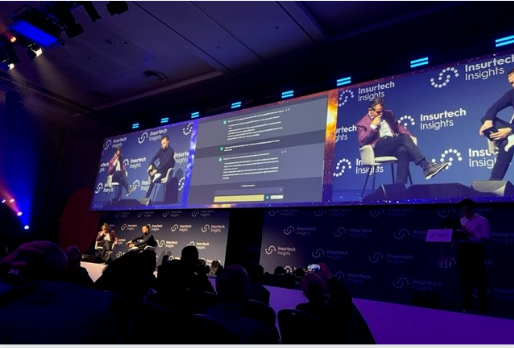

Whatever your feelings are about generative artificial intelligence (AI), ChatGPT believes it can positively impact the insurance industry.
The chatbot, which became a global sensation after its launch in November, made a case for itself at a demonstration at the Insurtech Insights Europe conference last week.
Prompted about the benefits it could give to insurance companies, ChatGPT its “knowledge” (based on 175 billion data parameters) and communication skills could assist customers with their insurance queries and help insurers stay on top of emerging trends and customer needs.
Man vs machine: Dr Artur Niemczewski will be live-sparring with ChatGPT and tackling the ethics of AI in insurance #InsuranceInsights2023 pic.twitter.com/jSxlxEPN0l
— Gia Snape (@GiaSnape) March 2, 2023
A highly intelligent AI language processing tool, ChatGPT sparked feverish debate about its implications for the digital world, even as it gained popularity in various industries such as healthcare and education.
But leaders of insurtech companies, many of which use AI to transform claims, underwriting, distribution, fraud detection and more, are optimistic about the doors that ChatGPT could open.
The combination of AI and a conversational interface could have transformative power for insurance, according to one CEO.
“If you can ask a computer, in natural language, to solve a problem for you, and it can do what you ask it for with a high probability, that’s a game changer,” said Amrit Santhirasenan, co-founder and CEO of hyperexponential.
“Additionally, if you have AI models that have the sophistication and freeform ability to interpret with intelligence, that is also going to have huge leverage. We’ll see practitioners who adopt these technologies really level up.”
It’s unlikely, at its current stage, for generative AI to completely replace underwriters, claims handlers, or customer service representative, experts said.
ChatGPT itself has a significant list of pitfalls: it can’t grasp context or nuance in human communication, such as sarcasm; it’s limited in its ability to handle multiple tasks; and it doesn’t have enough expertise to draft complex or technical documents, such as policy wordings.
It can also hold biases or prejudices, based on the data that it’s trained on, which opens a Pandora’s box of ethical issues for insurance companies.
The value in generative AI lies in its potential to automate non-core but essential tasks.
“If someone could write the right prompts to an AI, rather than manually format a spreadsheet, they could work in 100th or even a millionth of the time,” Santhirasenan said.
According to Roi Amir, CEO of Sprout.ai, insurance companies could use the underlying technology in to jumpstart their own innovations.
Sprout.ai trained its own AI to handle insurance claims data, boasting its claims automation platform can process most claims within minutes. Amir said other companies will be looking to harness generalized AI for similarly specific applications.
“If you look at many [AI] models today, you know, they are built to be very specific to a problem,” he told Insurance Business. “ChatGPT is a great generalized model. What I think we will see is many companies using it as their baseline model and add layers of intelligence and specificity for their individual domains.
“It will jumpstart a lot of things because it enables you to start from a much better level of abstraction. Smart companies will be leveraging that to solve very, very specific problems.”
Santhirasenan agreed: “If we take these sophisticated AI models and specialize them, we can create ‘supercharged’ versions of AI applications in different sectors [of insurance].”
It could take time, however, for some specialty and commercial lines to find value out of AI models because of lack of data, the CEO acknowledged. But personal lines like home and auto insurance, where there are hundreds of millions of data points already available for AI to leverage, could see astonishing results.
“We’re only at the beginning of this, but we could see some incredible things out of the personal lines spectrum [of business] very quickly,” Santhirasenan added.
Lawrence Buckler, VP of sales at Sprout.ai, pointed out that AI had existed as an invisible lever in insurance for many years, before ChatGPT came to mainstream consciousness.
“ChatGPT made something tangible that had never been tangible to a lot of people before. At Sprout, we've been using AI for several years to solve problems that most people don't see,” he said.
“Now we have customers that are using AI to fully resolve complex data problems very quickly, effectively, and consistently.”
While the evolution of the technology is still unclear, the overnight sensation around generative AI is a boon for insurance companies, noted Bill Brower, VP of industry relations and claims solutions at Solera.
“The biggest thing [ChatGPT] is doing for the insurance industry is that it gets people more and more comfortable with AI capability,” Brower said.
“The more we see consumers adopting AI in other areas of life, the more it’s going to help insurers with [using AI] in their applications.”
What are your thoughts on ChatGPT and its potential impact on insurance? Share them in the comments below.
